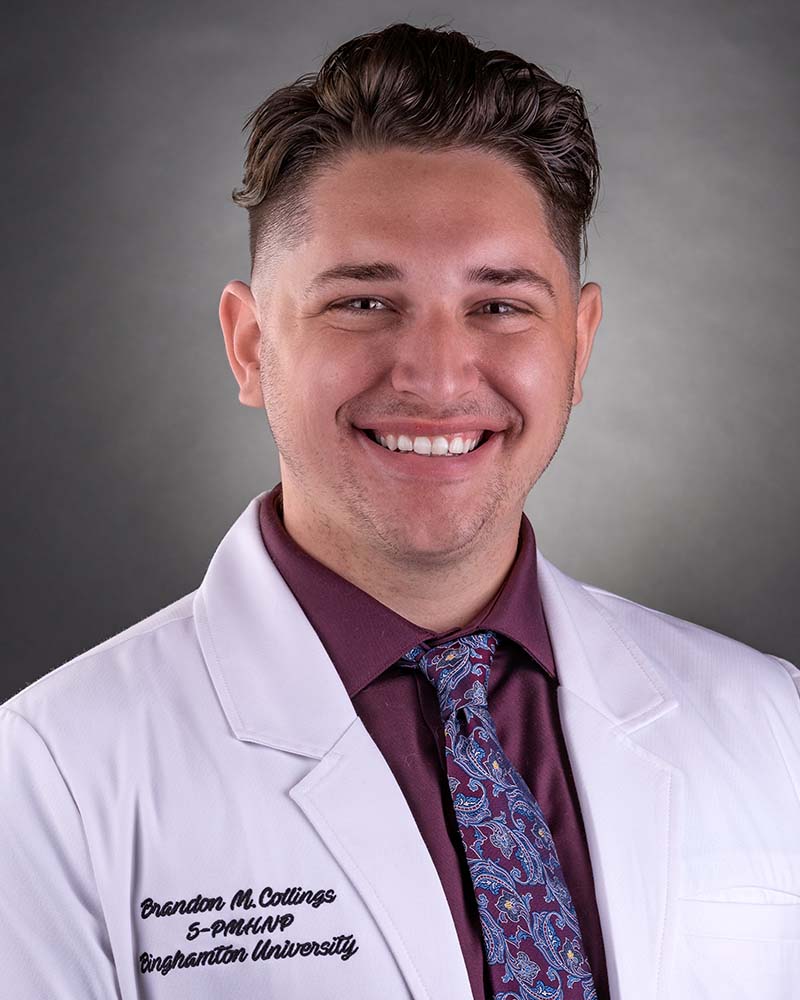Childhood experiences lead student to a career in mental health nursing

Brandon Collings was introduced to nursing as a 10-year-old child, after his father was critically injured in a motor vehicle accident.
It was nurses, he recalled, who briefed the family when they arrived at the hospital following the accident and also after every single one of what seemed to Collings like a lifetime of surgeries. Nurses were there to update them on his father’s condition, to support Collings’ father as he relearned to walk and to lend a supportive ear when Collings and his mom vented their emotions.
“Every day, the nurses would not only give fantastic care to my father, but also to my mother and me,” he said. “Even as a child, it was clear to me that these nurses were professional, caring and inspiring.”
That experience would later motivate Collings to earn an undergraduate degree in nursing, which he did at SUNY Plattsburgh. There, thanks to his professors and the supportive learning environment, he gained a solid foundation in nursing and as a student leader.
Collings is now building on that foundation, combining his love of nursing and interest in psychiatry, and inching closer to his dream of becoming a mental healthcare provider. In his second year at Binghamton University’s Decker College of Nursing and Health Sciences, Collings will graduate in May 2022 with a master’s degree in nursing in the psychiatric mental health nurse practitioner (PMHNP) specialization.
While it was his father’s accident that brought nursing to Collings’ life, it was his mother who sparked his interest in mental healthcare. She was a substance use counselor and mental health community advocate, and Collings frequently helped with outreach programs in his hometown, finding himself fascinated by the work.
“The one thing that we all have in common as humans is the conscious mind. Being able to explore that, discover what makes other people tick and help them alleviate suffering — maybe to their very core — is very interesting to me,” he said.
Like most students in Decker’s master’s-level nursing programs, Collings continues to work as a nurse. He previously worked on an inpatient psychiatric unit, but now works in a telemetry unit at Lourdes Hospital.
In addition, as part of his required clinical hours, Collings provides mental healthcare at the Decker Student Health Services Center clinic on campus. Overseen by Ramona Mazzeo, MD, a psychiatrist and director of psychiatry services at the University, Collings performs patient intakes and completes initial patient assessments, collaborates with the doctor and patient to develop a treatment plan, and then sees patients for their follow-up appointments.
“Brandon has been a great addition to our team,” Mazzeo said. “His experience working as a nurse already makes him very capable with clinical interactions from the start.”
“The [PMHNP] students being here helps the Binghamton students they see as patients get access to care quickly and conveniently on campus through their student health benefit,” Mazzeo said. “It is a win-win for [our] students all around.”
Collings has also been working with Mary Muscari, associate professor of nursing and coordinator of the PMHNP program at Decker College, on a repository of online stress-management resources for undergraduate and graduate nursing students. Available on Brightspace (the University’s learning-management platform), the goal is to provide students with web resources on a variety of topics.
“Brandon was part of the brainstorming process for the website and was especially helpful in building the time-management section by coming up with apps that students can use to be better organized,” Muscari said.
The web resource is an offshoot of Collings’ capstone project, “Social Media as a Vector for Health Promotion in Today’s Era of Mental Health,” which is a synthesis of existing research on the subject. It also provides insights on how psychiatric nurse practitioners can use social media to present information about topics such as bipolar disorders and depression or highlight local mental health services.
Collings posited that people use social media as a primary source of information in today’s society, so why not use it as a way to provide accurate information about mental health?
“I’m always thrilled when students come up with new ideas for capstone papers, and his was original,” Muscari said. “However, this is an important topic given both the popularity of social media and the amount of disinformation on it.”
Following graduation from Binghamton, Collings hopes to enter Upstate Medical University’s Psychiatric Nurse Practitioner Fellowship program. This initiative provides advanced, intensive training in psychiatric care for nurse practitioners and psychiatry residents. It also provides students with the opportunity to spend time in several psychiatric subspecialties.
Collings, however, already knows where he wants to focus: addiction psychiatry. He enjoys working with this patient population and feels it suits his get-right-to-the-point approach.
“I’ve always had the mindset that real recognizes real, and I’ve noticed that most of the people I work with who struggle with substance use disorders really appreciate that approach,” he said. “I’m not the kind of person to walk into a room with a white coat on and say, ‘Hi, I’m Mr. Collings, from yada yada team.’ I prefer to walk in and say, ‘Hey, I’m Brandon. This is what I do. Let’s talk about it.’”
Collings believes that people openly talking about mental health is one of the few positive effects of the COVID-19 pandemic.
“People were isolated and it brought out what some people have been suffering with secretly and silently for years,” he said. “It’s a blessing because people are more cognizant of what they’re feeling and thinking. They’re more okay with not being okay, and they’re seeking help.”
But, as more people reach out for mental healthcare, what was a significant need for providers before the pandemic is now a severe shortage. Collings hopes the recent spotlight on mental health and the awareness that psychiatric mental health nursing is, at its core, simply helping people who are struggling, will drive people toward the profession.
“The pandemic certainly made us aware of the need for more readily available, accessible and acceptable mental health resources to assist with the effects of this catastrophic crisis,” Muscari said. “This is particularly true for marginalized populations, rural people, and our frontline and essential workers. However, it also showed us the need for better mental health promotion in general. Far too many people lack the basic coping skills needed to manage everyday stressors, let alone a disaster — another reason why I think Brandon’s capstone is so important. “
For those working in healthcare and other helping professions, Collings has some advice: “Have something outside of your profession that you truly love and care about. You can’t be there for others if you don’t have something for yourself.”
His outlets? Being outdoors and playing and listening to music.

